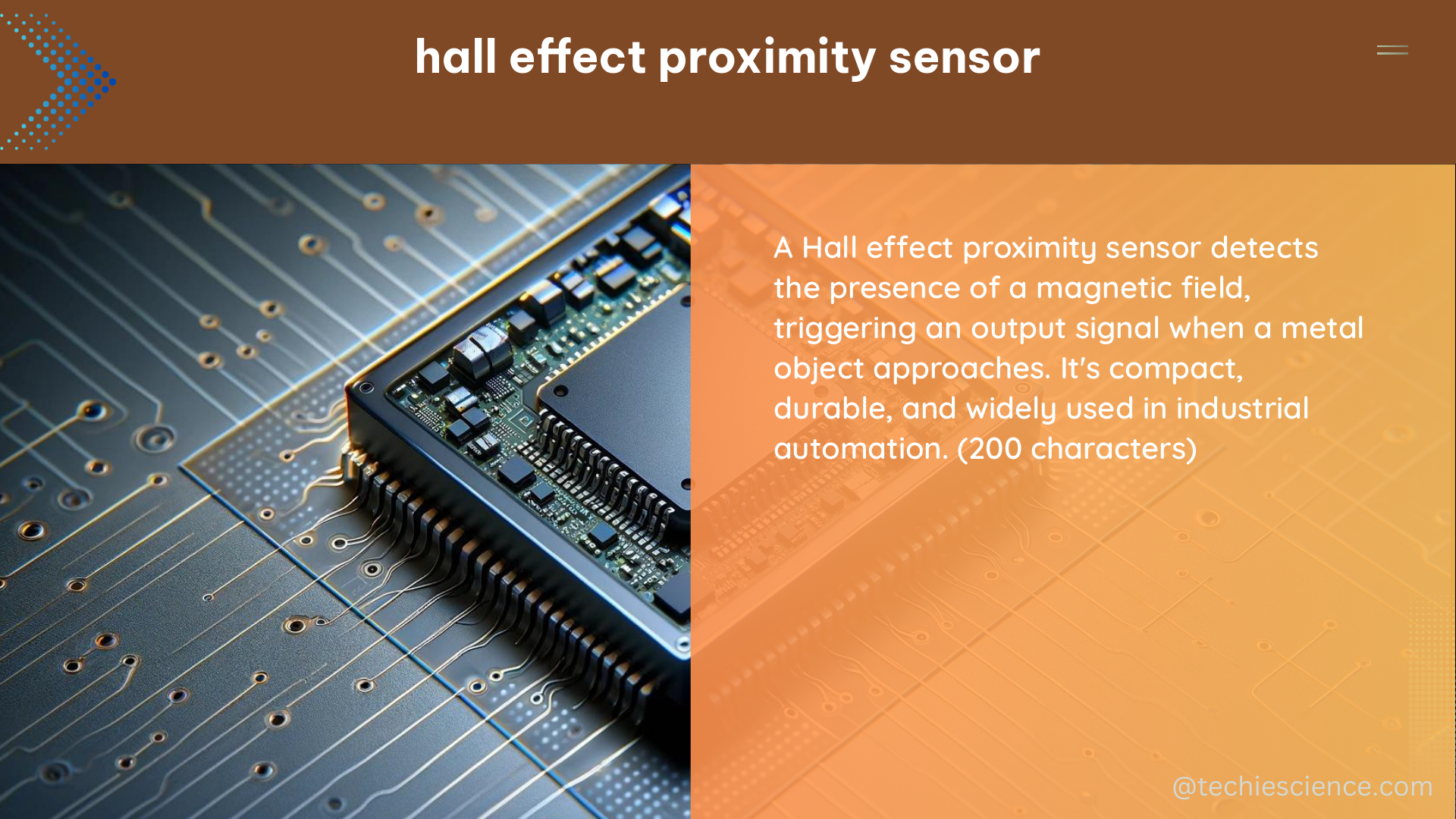The Hall Effect Proximity Sensor is a versatile device that utilizes the Hall Effect to detect the presence or absence of a magnetic field. This sensor outputs an analog voltage proportional to the strength of the magnetic field, making it a valuable tool for a wide range of applications.
Hall Effect Proximity Sensor: Technical Specifications
The TMCS1100 from Texas Instruments is a high-precision, basic isolation Hall-Effect Current Sensor that can accurately measure both DC and AC currents. This sensor boasts excellent linearity and sensitivity, with a factory-calibrated sensitivity of 100 mV/A, 200 mV/A, or 400 mV/A.
| Specification | Value |
|---|---|
| Magnetic Coupling Factor | mT/A |
| Hall Plate Sensitivity | mV/mT |
| Output Voltage Sensitivity | 100 mV/A, 200 mV/A, or 400 mV/A |
| Input Current Conductor Resistance | 1.8 mΩ |
| Bandwidth | 80 kHz |
The TMCS1100 generates a magnetic field within its internal 1.8 mΩ conductor, which is then measured by the integrated Hall-effect sensor. This allows the device to accurately measure both AC and DC currents.
Hall Effect Proximity Sensor: DIY

To use a Hall Effect Proximity Sensor for distance measurement, you can employ a linear Hall effect sensor. However, this approach requires careful calibration with a specific magnet and orientation. The process involves taking readings at set measured distances and recording the corresponding values, then repeating this at multiple positions to establish the appropriate measurement ranges.
Alternatively, you can utilize the VL53L0X laser sensor, which is relatively easy to use and provides accurate distance measurements. This sensor is particularly well-suited for applications where you need to detect the presence or absence of a magnet within a specific distance range, such as gap detection between a tool base and lid.
To use the Hall Effect Proximity Sensor as a proximity sensor to detect the presence of a magnet, you can employ a gaussmeter or teslameter to measure the external magnetic field. The sensor can then be used to monitor the response of the magnetic system to the sensor inputs.
Hall Effect Proximity Sensor: Applications
Hall Effect Proximity Sensors find a wide range of applications, including:
-
Motor and Load Control: These sensors are used to monitor and control the operation of motors and various loads, ensuring efficient and reliable performance.
-
Inverter and H-Bridge Current Measurements: Hall Effect Proximity Sensors are utilized in inverter and H-bridge circuits to accurately measure current, enabling precise control and protection.
-
Power Factor Correction: These sensors play a crucial role in power factor correction circuits, helping to maintain optimal power efficiency.
-
Overcurrent Protection: Hall Effect Proximity Sensors are employed in overcurrent protection systems, safeguarding against potentially damaging high-current conditions.
-
DC and AC Power Monitoring: These sensors are used to monitor and measure both DC and AC power, providing valuable data for energy management and optimization.
-
Non-Contact Measurement: Hall Effect Proximity Sensors are used in non-contact measurement applications, such as gap detection between a tool base and lid, where accurate detection of closure within a range of 0 to 10 mm, ideally within 40 μm, is required.
By leveraging the Hall Effect, these versatile sensors offer a reliable and precise solution for a wide range of industrial, automotive, and consumer electronics applications.
References
- Measure Distance with Hall Effect Sensor
- TMCS1100 Datasheet
- Accurately Measuring Distance Using Hall Effect
- Hall Effect Handbook
- Hall Effect Sensor Projects

The lambdageeks.com Core SME Team is a group of experienced subject matter experts from diverse scientific and technical fields including Physics, Chemistry, Technology,Electronics & Electrical Engineering, Automotive, Mechanical Engineering. Our team collaborates to create high-quality, well-researched articles on a wide range of science and technology topics for the lambdageeks.com website.
All Our Senior SME are having more than 7 Years of experience in the respective fields . They are either Working Industry Professionals or assocaited With different Universities. Refer Our Authors Page to get to know About our Core SMEs.